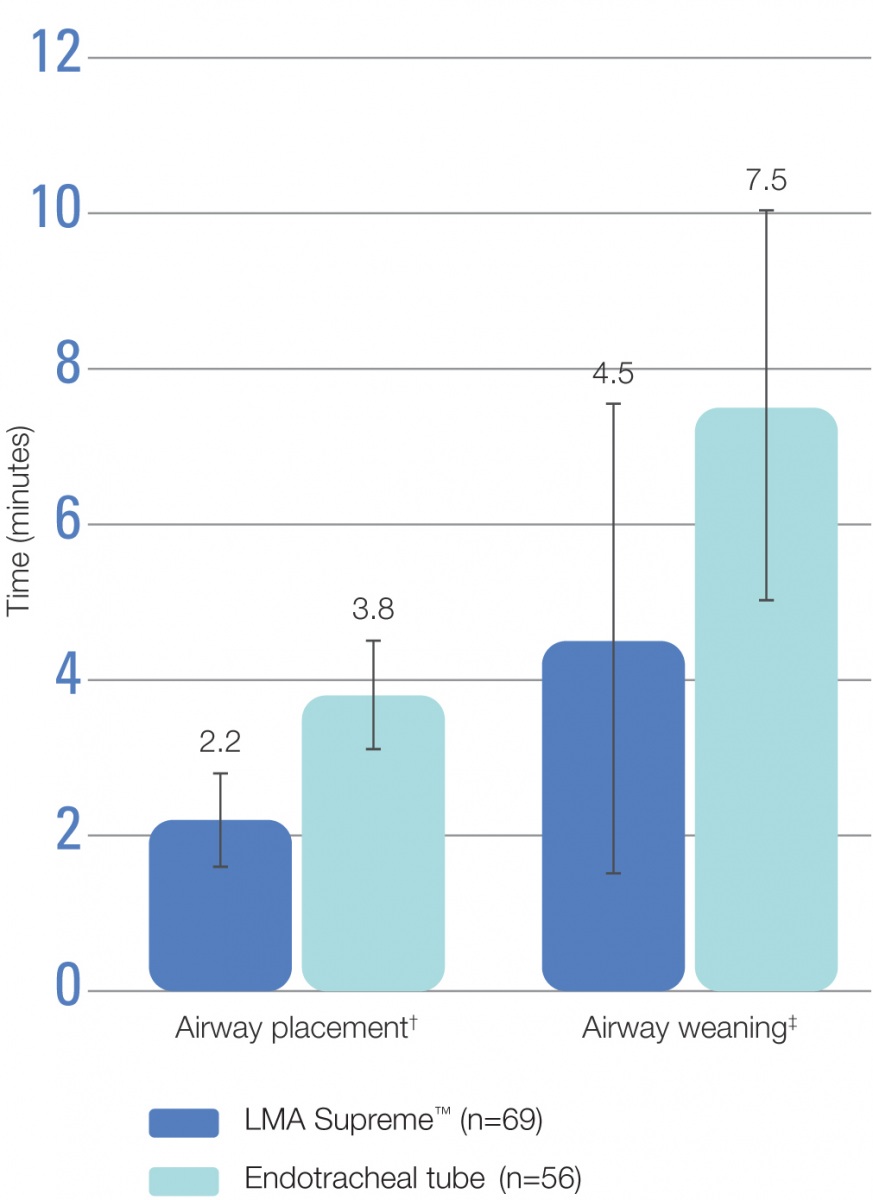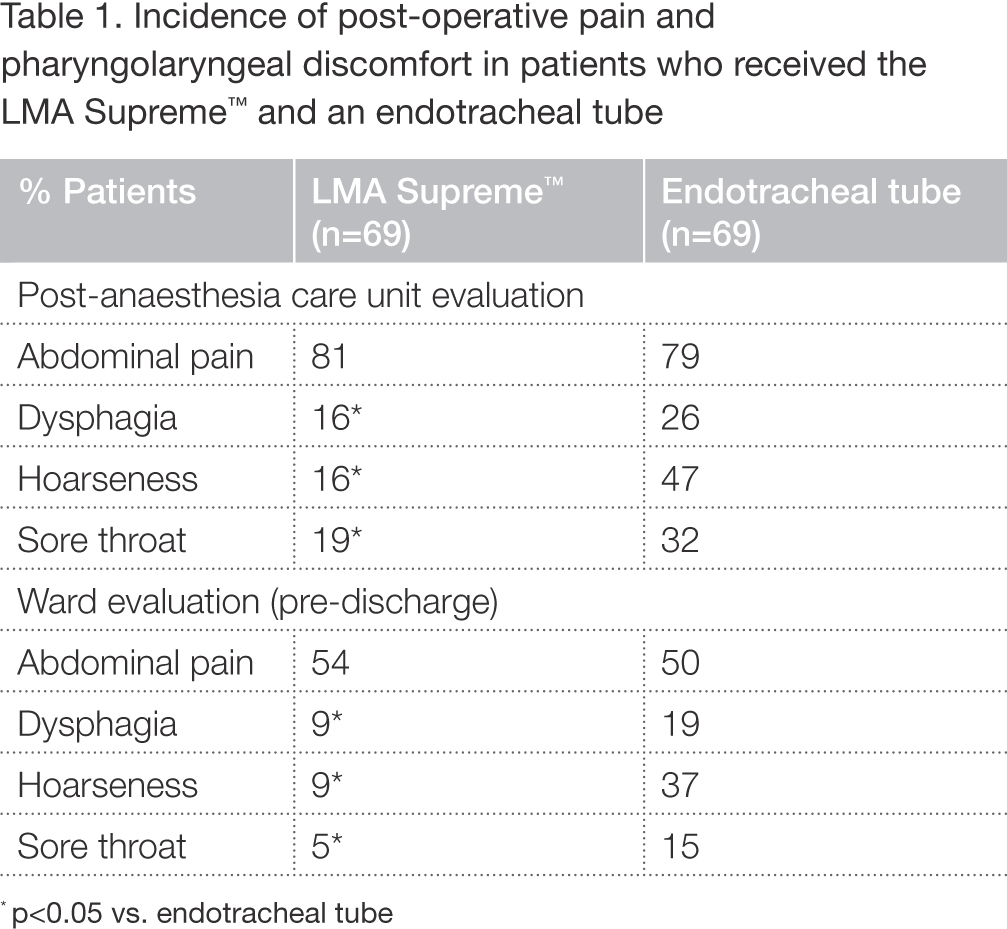Sparing the larynx during gynecological laparoscopy: a randomized trial comparing the LMA Supreme™ and the ETT
Authors
Abdi W. et al.
Publication
Acta Anaesthesiol Scand 2010; 54 (2): 141-146.
Summary
- A study to compare the performance of the LMA Supreme™ and an endotracheal tube in patients undergoing elective gynaecological pelvic laparoscopy requiring anaesthesia
- The average time to airway placement and weaning was shorter in patients who received the LMA Supreme™ versus the endotracheal tube
- The LMA Supreme™ was associated with less post-operative pharyngolaryngeal morbidity than an endotracheal tube in patients undergoing routine gynaecological laparoscopic procedures
Objectives:
- To compare the performance of the LMA Supreme™ and an endotracheal tube in patients undergoing elective gynaecological pelvic laparoscopy requiring anaesthesia
Method:
- This was a prospective, randomised, single-blind study undertaken in American Society of Anesthesiologists class 1 or 2 adult female patients with normal airways
- Patients were randomised to receive airway management with either the LMA Supreme™ or an endotracheal tube
- Outcomes of interest were
- Pharyngolaryngeal discomfort in the post-operative period
- Ventilation efficiency
- The difficulty of airway management was assessed using a visual analogue scale (VAS) ranging from 0 (no difficulty) to 100 (impossible)
- The intensity of pharyngolaryngeal symptoms was measured using a numerical rating scale (NRS) ranging from 0 (no discomfort/pain) to 100 (extreme discomfort/ maximal imaginable pain)
- All surgical procedures were performed by a single surgeon who was blinded to the airway management technique used
Results:
- Patients were randomised to receive the LMA Supreme™ (n=69) or an endotracheal tube (n=69)
- The demographic characteristics of the two groups of patients were similar (mean age 33 years; mean body weight 66 kg)
- Ventilation was successful in all patients, regardless of whether they received the LMA Supreme™ or an endotracheal tube
- The maximum peak airway pressure during anaesthesia was 25 and 23 cm H2O in patients fitted with the LMA Supreme™ and an endotracheal tube, respectively
- The average time to airway placement and weaning was shorter in patients who received the LMA Supreme™ versus an endotracheal tube (Figure 1)
Figure 1. Duration of airway placement and weaning in patients who received the LMA Supreme™ and an endotracheal tube (data are shown as mean ± standard deviation)
† Time from injection of atracurium to definitive ventilation through the airway; ‡ Time from the last trocar to airway removal
- The median VAS score for airway management difficulty was 5 (range 0-25) in the LMA Supreme™ group and 5 (range 0-40) in the endotracheal tube group
- The incidences of nausea and vomiting and the need for analgesia in the post-operative period were similar in both patient groups
- The incidences of dysphagia, hoarseness and sore throat were significantly (p<0.05) lower in patients who received the LMA Supreme™ versus an endotracheal tube (Table 1)
- Assessments in the post-anaesthesia care unit showed that patients who received the LMA Supreme™ versus the endotracheal tube reported a significantly (p<0.05) lower intensity of dysphagia (mean NRS score 7 vs. 15) and hoarseness (mean NRS score 3 vs. 19)
- In the ward prior to discharge, the intensity of hoarseness remained significantly lower in patients who received the LMA Supreme™ versus the endotracheal tube (mean NRS score 1 vs. 10; p<0.05)
- Two patients in the endotracheal tube group complained of hoarseness at an evaluation visit at day 5-7 (compared with no patients treated with the LMA Supreme™)
Conclusions:
- The LMA Supreme™ and an endotracheal tube were similarly effective ventilation devices in patients undergoing routine gynaecological laparoscopic procedures
- The incidence and intensity of post-operative pharyngolaryngeal morbidity was reduced in patients who received the LMA Supreme™ versus an endotracheal tube

